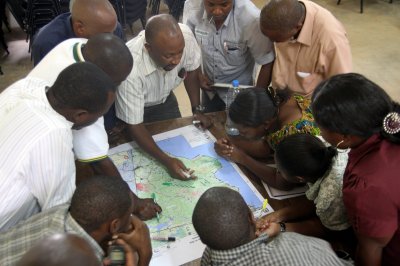We at the Africa Biodiversity Collaborative Group (ABCG) are pleased to announce the release of our Final Technical Report for U.S. Agency for International Development (USAID) Cooperative Agreement RLA-A-00-07-00043-00, which concluded on March 31, 2015. Over the seven-and-a-half-year life of the agreement, our seven member NGOs and their partners conducted activities under 22 different tasks to address major threats to Africa’s biodiversity and contribute to sound development and security in Africa through the wise use of natural resources and the maintenance of ecosystem services.

Our accomplishments under the agreement underscore the assets our unique consortium offers conservation: pooling members’ resources toward common goals, acting quickly to respond to emerging issues, and forming innovative partnerships. Four member NGOs—Conservation International, The Nature Conservancy, Wildlife Conservation Society, and World Wildlife Fund-United States—combined their expertise and on-the-ground presence to develop and test in four African countries a survey that can serve as a profession-wide model for learning how rural people in natural-resource livelihoods cope with global climate change’s effects on their local ecosystems. Our members seized the opportunity of fledgling relationships among religious and conservation leaders to generate interest in East African and Chinese faith communities to fight the trafficking of African wildlife. And, recognizing that development projects which combine freshwater conservation goals for biodiversity wellbeing with water, sanitation, and hygiene (WASH) goals for human wellbeing can accomplish more, and more cost-effectively, than single-sector freshwater efforts, we created the first-ever template for cooperation between these two communities of practice.
The report presents highlights from these and the other activities we undertook through USAID’s generous support. We hope readers will find the report informative, and that the consortium’s work under the agreement will serve as a foundation for conservation in Africa for years to come.


Add a Comment